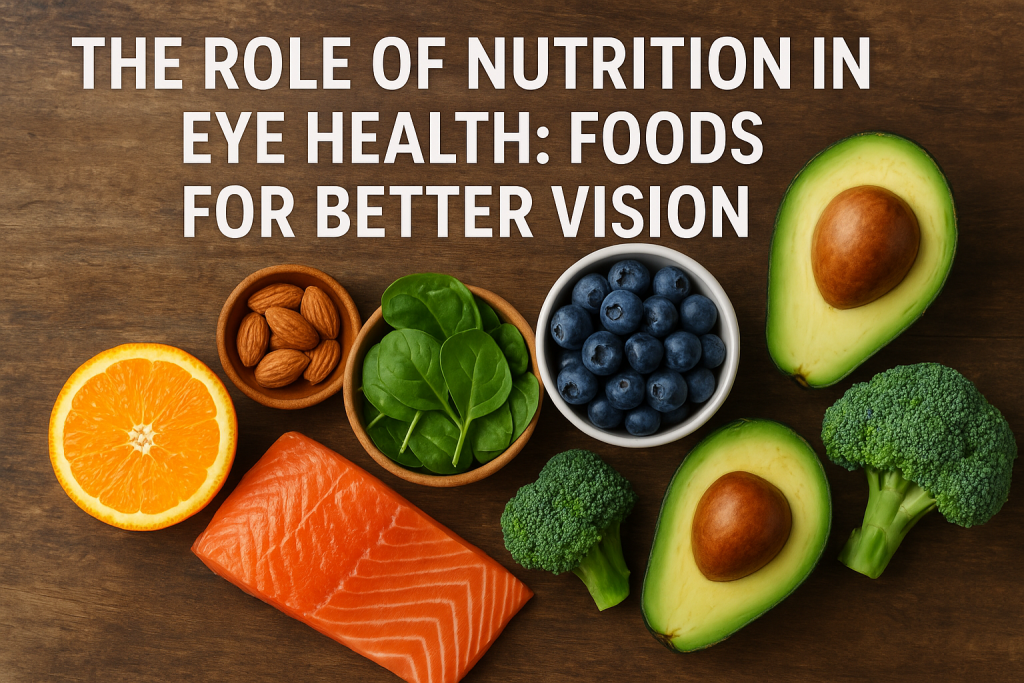
Nutrition for Eye Health: Foods That Help Protect and Improve Vision
“What you eat reflects in how you see.” This statement couldn’t be truer when it comes to eye health. Proper nutrition plays a vital role in maintaining long-term vision and protecting against age-related eye conditions. While regular eye exams and good lifestyle habits are essential, what you put on your plate can significantly influence how well your eyes function today and in the years to come. In this article, we’ll explore the nutrients crucial for eye health, the best foods to include in your diet, and practical tips for maintaining healthy vision through nutrition.
The Link Between Diet and Eye Health
Our eyes are highly sensitive organs, and they rely on a steady supply of vitamins, minerals, and antioxidants to function properly. Nutritional deficiencies can lead to a variety of vision problems, from night blindness to macular degeneration. By incorporating nutrient-rich foods into your meals, you not only support your eyes but also enhance overall well-being. A diet focused on eye health can reduce the risk of chronic eye conditions, improve night vision, and help maintain clear and sharp eyesight.
Vitamin A: Essential for the Cornea
Vitamin A is one of the most well-known nutrients for eye health. It plays a critical role in maintaining the cornea — the outer layer of the eye — and supporting overall vision, particularly in low-light conditions.
Best sources of vitamin A:
-
Carrots
-
Sweet potatoes
-
Butternut squash
-
Red peppers
-
Eggs
A deficiency in vitamin A can lead to dry eyes, night blindness, and even more severe eye conditions if left untreated. By including these colorful foods in your diet, you can ensure your eyes have the nutrients they need to function optimally.
Lutein and Zeaxanthin: Antioxidants for the Retina
Leafy green vegetables are packed with lutein and zeaxanthin, two antioxidants that accumulate in the retina and help protect against damage from harmful blue light and free radicals. These nutrients have been shown to reduce the risk of age-related macular degeneration (AMD), a leading cause of vision loss in older adults.
Best sources of lutein and zeaxanthin:
-
Spinach
-
Kale
-
Collard greens
-
Broccoli
-
Peas
Regularly consuming these foods can improve overall eye resilience, supporting long-term vision and reducing the risk of degenerative eye diseases.
Vitamin C: Strengthening Eye Blood Vessels
Vitamin C is a powerful antioxidant that protects your eyes from oxidative stress and supports the health of blood vessels within the eyes. Studies have linked adequate vitamin C intake with a lower risk of cataracts and slowed progression of AMD.
Best sources of vitamin C:
-
Oranges
-
Grapefruits
-
Lemons
-
Strawberries
-
Blueberries
-
Bell peppers
Incorporating vitamin C-rich fruits and vegetables into your daily diet helps maintain the integrity of the eye’s delicate tissues while providing a tasty boost to overall immunity.
Vitamin E: Protecting Against Oxidative Stress
Vitamin E is another essential antioxidant that protects eye cells from oxidative damage caused by free radicals. This is particularly important as we age, since oxidative stress can contribute to the development of cataracts and AMD.
Best sources of vitamin E:
-
Almonds
-
Sunflower seeds
-
Hazelnuts
-
Spinach
-
Avocados
Including vitamin E-rich foods in your diet helps safeguard your eyes against age-related damage while supporting skin and heart health.
Omega-3 Fatty Acids: Reducing Dry Eyes
Omega-3 fatty acids, particularly EPA and DHA, are crucial for eye health. They help maintain the function of the retina, support tear production, and reduce the risk of dry eye syndrome — a common complaint among individuals who spend long hours in front of screens.
Best sources of omega-3s:
-
Fatty fish like salmon, mackerel, and sardines
-
Flaxseeds
-
Chia seeds
-
Walnuts
-
Hemp seeds
Incorporating these healthy fats into your diet not only benefits your eyes but also promotes cardiovascular health and reduces inflammation throughout the body.
Other Nutrients That Support Eye Health
In addition to vitamins A, C, E, lutein, zeaxanthin, and omega-3 fatty acids, several other nutrients play a role in maintaining healthy vision:
-
Zinc: Found in oysters, beef, pumpkin seeds, and lentils, zinc supports retinal health and may help prevent night blindness.
-
Copper: Present in shellfish, nuts, and seeds, copper is essential for maintaining proper eye function and overall health.
-
Selenium: Available in Brazil nuts, eggs, and fish, selenium helps protect the eyes from oxidative damage.
Eating a variety of nutrient-dense foods ensures your eyes get all the essential compounds they need to perform optimally.
Tips for an Eye-Friendly Diet
-
Eat a rainbow of fruits and vegetables: Different colors indicate different nutrients — the more variety, the better for your eyes.
-
Include healthy fats: Nuts, seeds, and fish provide essential fatty acids that nourish eye tissues.
-
Stay hydrated: Adequate water intake prevents dryness and supports overall eye comfort.
-
Limit processed foods and sugar: Excess sugar can contribute to diabetes, which in turn increases the risk of diabetic retinopathy.
-
Consider fortified foods or supplements: If you struggle to get enough nutrients from your diet, consult an eye care professional about supplements.
Lifestyle Factors That Complement Nutrition
While nutrition is critical, a holistic approach to eye health also includes:
-
Regular eye exams: Detecting problems early can prevent long-term damage.
-
Screen breaks: Follow the 20-20-20 rule — every 20 minutes, look at something 20 feet away for 20 seconds.
-
Protective eyewear: Sunglasses with UV protection prevent damage from harmful sun rays.
-
Sleep: Quality sleep allows eyes to rest and repair from daily stress.
Combining proper nutrition with these habits maximizes the benefits for eye health and overall wellness.
Conclusion
Maintaining healthy vision doesn’t have to be complicated. By prioritizing nutrient-rich foods — from carrots and leafy greens to citrus fruits, nuts, seeds, and fatty fish — you can actively support your eyes and reduce the risk of age-related problems. Nutrition works hand-in-hand with lifestyle choices and regular eye care to keep your vision sharp, comfortable, and resilient.
Remember, a balanced diet isn’t just good for your body — it’s good for your eyes. So, the next time you plan a meal, think about adding eye-friendly ingredients. After all, healthy eyes start from within.
